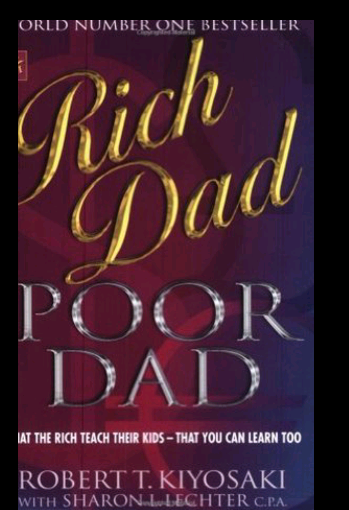Rich dad, poor dad: my financial eye-opener
The world is growing every day and different things are being initiated that are limiting manpower, that is technology is taking over, and amid this many people do not see the reason to add their education to another means of livelihood like learning of hand work. I come from a country where if you don't learn any trade, your education and the knowledge you spent millions to acquire will be rendered useless. This is a country where your survival depends on how creative you are, leaving your education aside because you might later in the future not need the certificate you acquired in school as a means of livelihood.
This is my first time in this wonderful community and I have always heard of the phrase "readers are leaders". Books written by different authors have one way or another found positive ways to impact our lives. I have always tried to read books that are combinations of good words that are capable of putting me on the right track in my journey in life.
Growing up, I grew up with a father who is a web3 professional, I do sit with him whenever he is doing his things but I never show interest. One faithful day, he brought out a book from his bag and handed it over to me and he said "This is the book that I read while growing up that changed my perspective on how to make decisions for my financial life. Go read it and come back to give me a review of how it has impacted your life".
I took it and promised to read it, the title seemed a bit off to me when I saw Rich Dad and, Poor Dad. Then I laughed and dropped it on my table, a few days later I picked it up to read and the first chapter wasn't as interesting as I had hoped and that made me abandon it. I had always wanted to be like my father, I love the way he handles his businesses and how independent he is. Despite being educated, he has other things that fetch him cool cash.

I couldn't take my mind off the book so I had to take it to read again, it was authored by Robert T Kiyosaki (a Japanese-American businessman and author) and Sharon Lechter. This is one of Robert Kiyosaki's best-selling books of all time. It was written in the year 1997, It advocates the importance of financial literacy, financial independence, and building wealth by investing in assets, real estate investing, starting and owning businesses, and increasing one's financial intelligence.
It is a non-fiction and personal finance book, full of enlightenment on how to make money work for you, and also challenges the traditional beliefs about money. The book emphasizes an eye-opener telling people not to depend on their school certificate, many would have misquoted him just like I did. When I first read a few pages, I asked myself, "Was he preaching against education?" but when I had a full understanding of his points, I was able to relate well to the book.
In this book, the author talks about his father(poor dad) and the father of his best friend (rich dad) and how both of them shaped his thoughts about money and investing. In this book, I was able to pick five vital lessons that serve as guidelines for my financial journey. There are more if you read through but I chose these five amongst all.
Firstly, improve your financial intelligence, this book emphasizes the importance of educating oneself about money, investment, and personal finance.
Secondly, don't be scared to take risks, taking risks is part of what builds one's financial intelligence. To make money work for you, you have to go out of your comfort zone. Another point I took note of is control your spending, this book emphasizes the significance of living within your means and keeping your expenses under control. Being conscious of one's spending helps in wealth growth and financial independence.
The fourth point is how to achieve financial success, this book questions the conventional wisdom that a formal education is required to achieve financial success. As I said earlier, school certification doesn't guarantee financial success, don't get me wrong, I'm not saying getting educated is not good. All I'm saying is that one shouldn't depend solely on his or her education because if you happen to fall to a country where the government cares less or not about the citizen's wellbeing then your skills will be the only saving grace of have.
Lastly, accept and learn from failure, learning from mistakes and setbacks isn't a crime, sometimes mistakes may be advantageous experiences that result in personal and financial development. I was able to pick these points from the book and apply them to my financial life as a young adult. When I started my clothing business and at a point, I ran into loss in the early days, I wanted to give up but I remembered one of the points stated above which is "accept and learn from failure", I guided myself in that path, learned from my mistakes and try harder not to repeat such mistakes and today I'm doing well in my business.
This is my reply to the @creativemary book contest on the book that inspires one's life.
Thanks for your time and your comments will be appreciated.

Does that mean when you were kids your father is already a web3 professional?
I read this book a fair few years ago and there are some very good ideas in it. However, what I like most about books like this is that they make you reconsider your acceptance of what is taken to be the norm.
Exactly , it helped though.